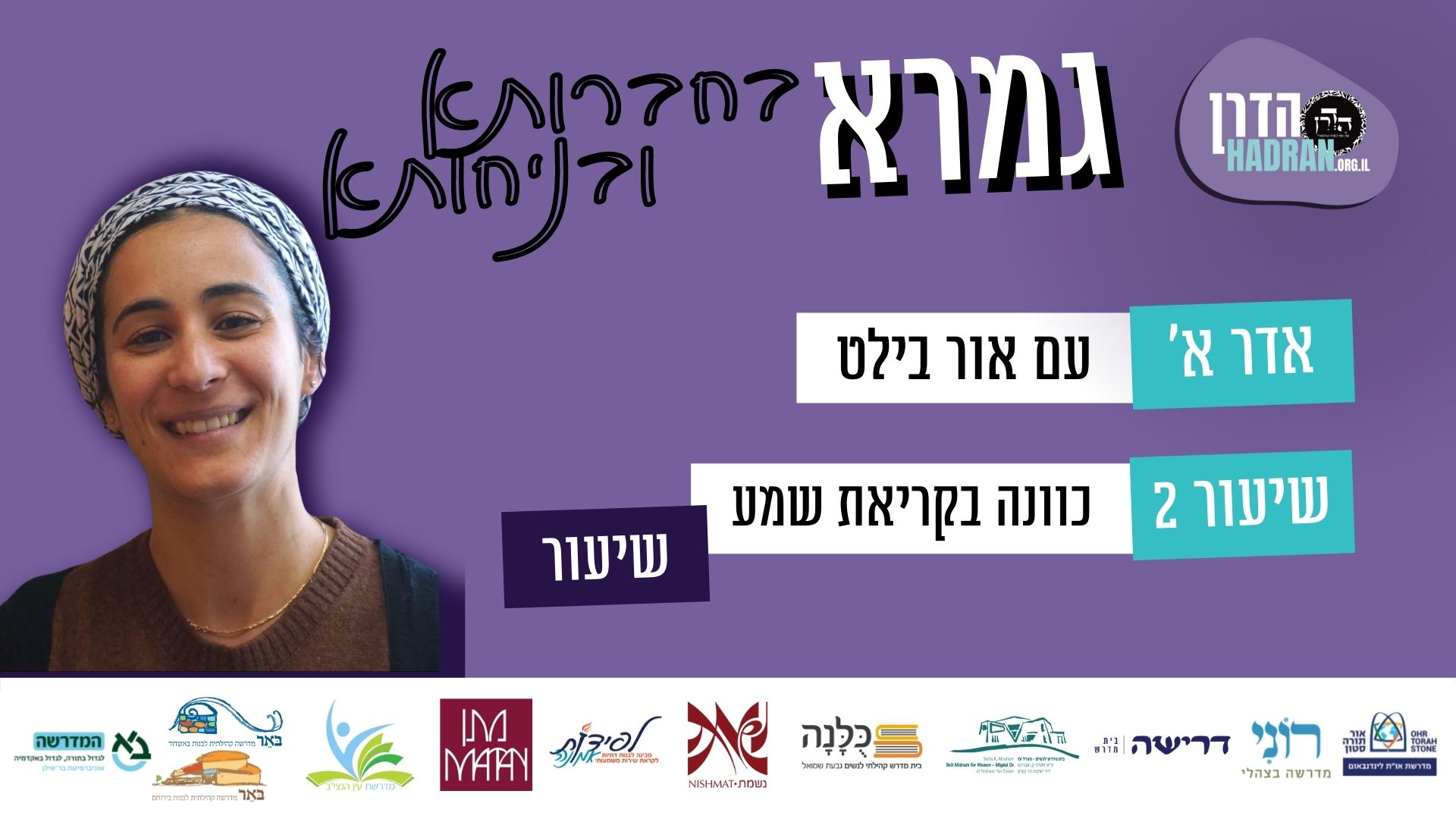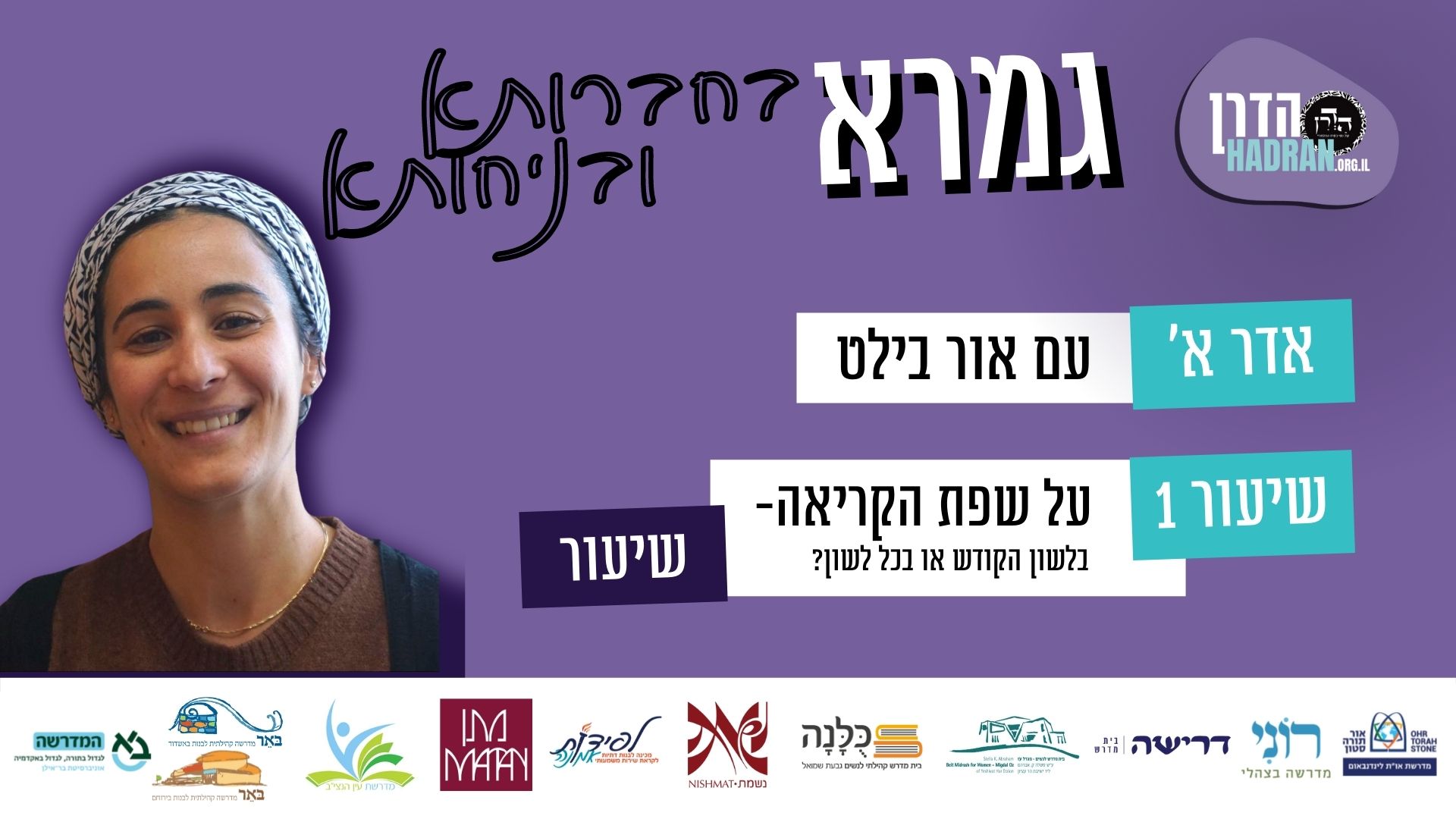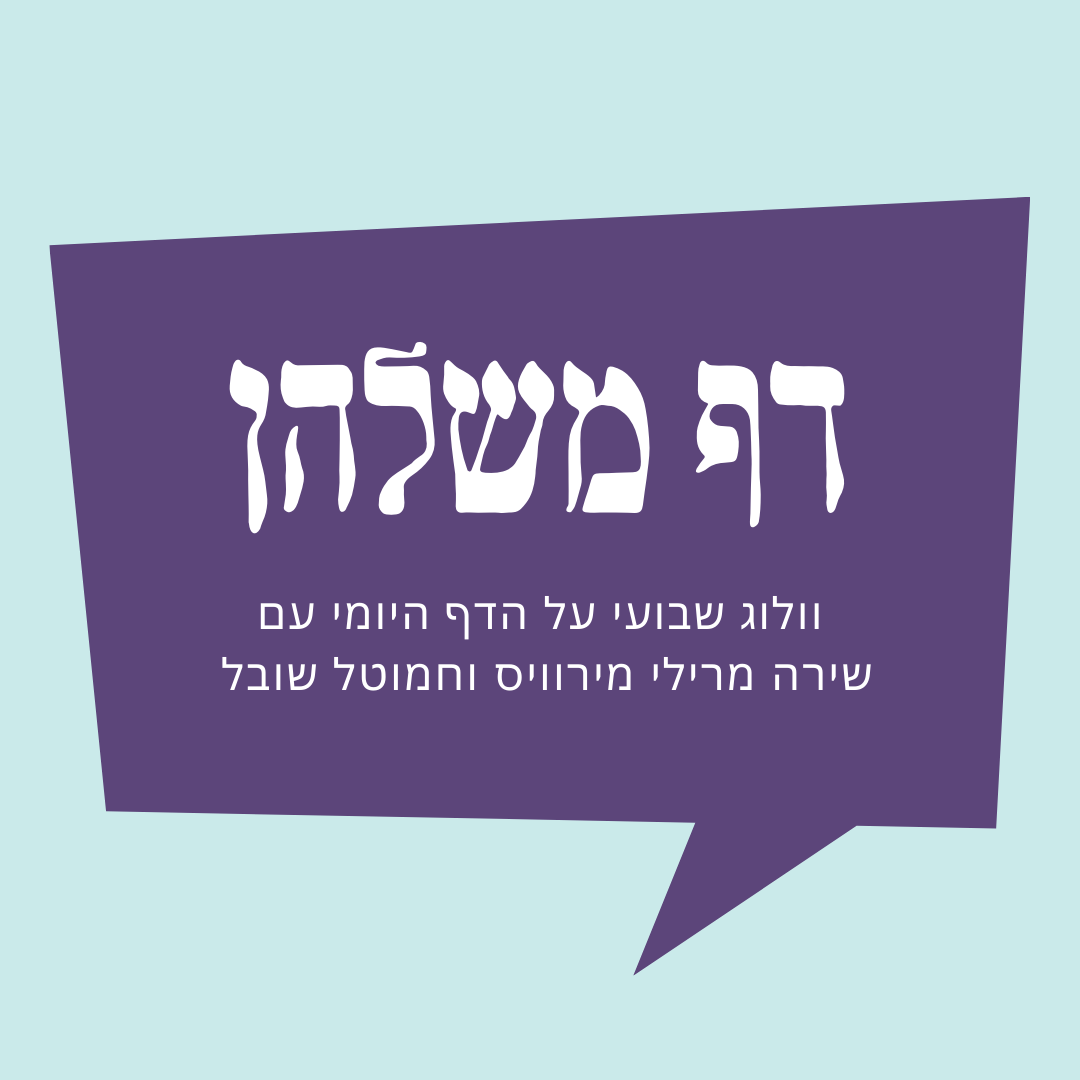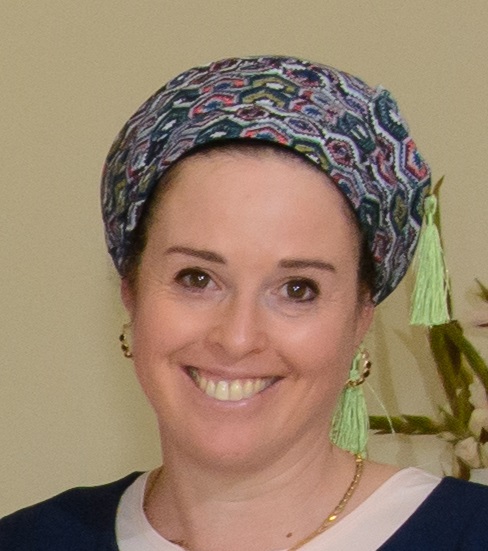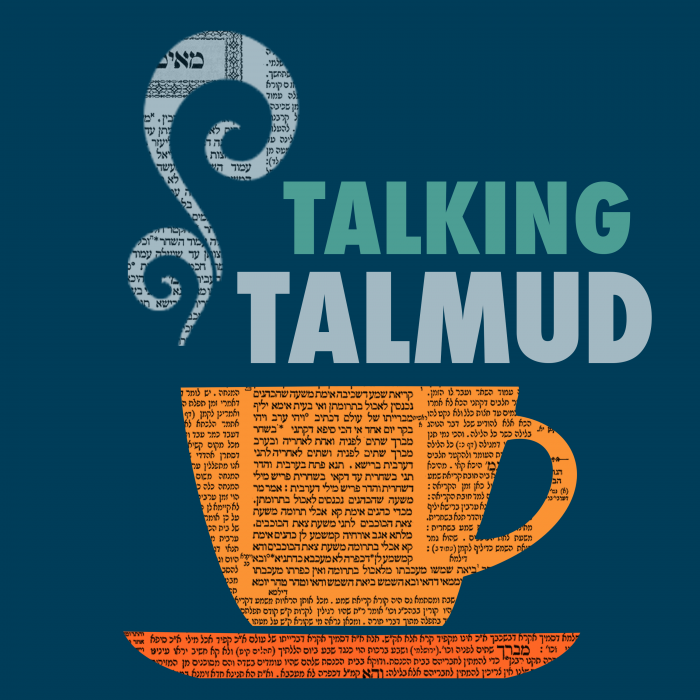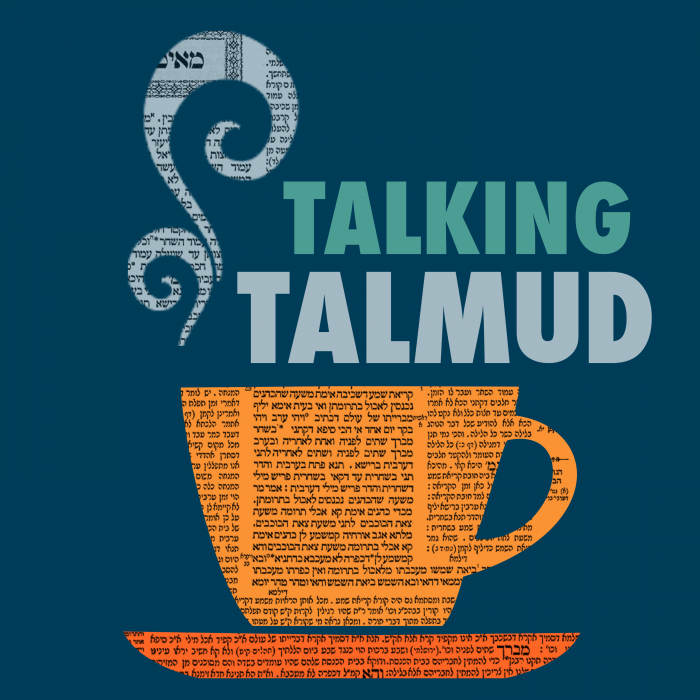הגמרא מרחיבה ומסבירה את נקודות המחלוקות בין בית שמאי לבית הלל במשנה בענייני סעודה.
רוצה להקדיש שיעור?
כלים
העמקה
רוצה להבין מה באמת קורה מתחת לפני השטח של הסוגיה?
שיעורים, פודקאסטים והרחבות של מיטב המורות שלנו יפתחו לך עוד זוויות וכיווני חשיבה.
חדשה בלימוד הגמרא?
זה הדף הראשון שלך? איזו התרגשות עצומה! יש לנו בדיוק את התכנים והכלים שיעזרו לך לעשות את הצעדים הראשונים ללמידה בקצב וברמה שלך, כך תוכלי להרגיש בנוח גם בתוך הסוגיות המורכבות ומאתגרות.
פסיפס הלומדות שלנו
גלי את קהילת הלומדות שלנו, מגוון נשים, רקעים וסיפורים. כולן חלק מתנועה ומסע מרגש ועוצמתי.
ברכות נב
וְרַבִּי יְהוֹשֻׁעַ הִיא, דְּאָמַר: אֵין מַשְׁגִּיחִין בְּבַת קוֹל.
and this Tosefta is in accordance with the opinion of Rabbi Yehoshua, who said, with regard to the Divine Voice that emerged and proclaimed that the halakha is in accordance with the opinion of Rabbi Eliezer in the case of the oven of akhnai (Bava Metzia 59b), that one disregards a Heavenly Voice. Just as he disregarded the Divine Voice in his dispute with Rabbi Eliezer, so too, one disregards the Divine Voice that proclaimed that the halakha is in accordance with the opinion of Beit Hillel.
וְסָבְרִי בֵּית שַׁמַּאי דְּבִרְכַּת הַיּוֹם עֲדִיפָא? וְהָתַנְיָא: הַנִּכְנָס לְבֵיתוֹ בְּמוֹצָאֵי שַׁבָּת, מְבָרֵךְ עַל הַיַּיִן וְעַל הַמָּאוֹר וְעַל הַבְּשָׂמִים, וְאַחַר כָּךְ אוֹמֵר הַבְדָּלָה. וְאִם אֵין לוֹ אֶלָּא כּוֹס אֶחָד, מַנִּיחוֹ לְאַחַר הַמָּזוֹן וּמְשַׁלְשְׁלָן כּוּלָּן לְאַחֲרָיו.
As to the substance of these statements, the Gemara asks: Do Beit Shammai hold that the blessing over the day takes precedence? Wasn’t it taught in a baraita: One who enters his house at the conclusion of Shabbat recites a blessing over the wine, then over the candle, then over the spices, and recites havdala thereafter? And if he has only one cup of wine, he leaves it for after the last Shabbat meal and arranges all of the blessings: Grace after Meals, the blessings of havdala and the blessing over wine together thereafter. Evidently, the blessing over wine precedes the primary havdala blessing.
וְהָא, מִמַּאי דְּבֵית שַׁמַּאי הִיא? דִּלְמָא בֵּית הִלֵּל הִיא?!
The Gemara asks: And this baraita, from where is it ascertained that it is in accordance with the opinion of Beit Shammai? Perhaps it is in accordance with the opinion of Beit Hillel. Beit Shammai’s opinion cannot be challenged with an unattributed baraita.
לָא סָלְקָא דַּעְתָּךְ, דְּקָתָנֵי מָאוֹר וְאַחַר כָּךְ בְּשָׂמִים, וּמַאן שָׁמְעַתְּ לֵיהּ דְּאִית לֵיהּ הַאי סְבָרָא — בֵּית שַׁמַּאי, דְּתַנְיָא אָמַר רַבִּי יְהוּדָה: לֹא נֶחְלְקוּ בֵּית שַׁמַּאי וּבֵית הִלֵּל עַל הַמָּזוֹן שֶׁבִּתְחִלָּה וְעַל הַבְדָּלָה שֶׁהִיא בַּסּוֹף, עַל מָה נֶחְלְקוּ — עַל הַמָּאוֹר וְעַל הַבְּשָׂמִים. בֵּית שַׁמַּאי אוֹמְרִים: מָאוֹר וְאַחַר כָּךְ בְּשָׂמִים, וּבֵית הִלֵּל אוֹמְרִים: בְּשָׂמִים וְאַחַר כָּךְ מָאוֹר.
The Gemara responds: It cannot enter your mind that this baraita is in accordance with the opinion of Beit Hillel, as it was taught at the beginning of the baraita: Light and spices thereafter. And who, did you hear, adopts that reasoning? Beit Shammai. As it was taught in a Tosefta that Rabbi Yehuda said: Beit Shammai and Beit Hillel did not dispute that Grace after Meals is recited first and that havdala is recited last. With regard to what did they disagree? With regard to the blessings recited in the middle of havdala, the blessings over the light and over the spices. Beit Shammai say: Light and spices thereafter; and Beit Hillel say: Spices and light thereafter. Therefore, the baraita, where it is taught that the blessing over the candle precedes the blessing over the spices, must be according to Beit Shammai and it says that wine precedes havdala.
וּמִמַּאי דְּבֵית שַׁמַּאי הִיא וְאַלִּיבָּא דְּרַבִּי יְהוּדָה, דִּילְמָא בֵּית הִלֵּל הִיא וְאַלִּיבָּא דְּרַבִּי מֵאִיר?!
The Gemara presents another challenge: And from where do you ascertain that this baraita is the opinion of Beit Shammai in accordance with the interpretation of Rabbi Yehuda? Perhaps it is the opinion of Beit Hillel in accordance with the interpretation of Rabbi Meir.
לָא סָלְקָא דַּעְתָּךְ, דְּקָתָנֵי הָכָא בְּמַתְנִיתִין, בֵּית שַׁמַּאי אוֹמְרִים: נֵר וּמָזוֹן בְּשָׂמִים וְהַבְדָּלָה, וּבֵית הִלֵּל אוֹמְרִים: נֵר וּבְשָׂמִים מָזוֹן וְהַבְדָּלָה, וְהָתָם בְּבָרַיְיתָא קָתָנֵי אִם אֵין לוֹ אֶלָּא כּוֹס אֶחָד, מַנִּיחוֹ לְאַחַר הַמָּזוֹן, וּמְשַׁלְשְׁלָן כּוּלָּן לְאַחֲרָיו. שְׁמַע מִינַּהּ דְּבֵית שַׁמַּאי הִיא וְאַלִּיבָּא דְּרַבִּי יְהוּדָה.
The Gemara responds: It cannot enter your mind that this baraita is the opinion of Beit Hillel in accordance with the interpretation of Rabbi Meir. As it was taught here in the mishna, which like all unattributed mishnayot is in accordance with the opinion of Rabbi Meir: Beit Shammai say: One recites the blessing over the candle, then the Grace after Meals blessing, then the blessing over the spices, and finally the blessing of havdala. And Beit Hillel say: The order is candle, spices, Grace after Meals, and havdala. And there, in the baraita, it was taught: And if he has only one cup of wine, he leaves it for after the last Shabbat meal and arranges all of the blessings: Grace after Meals, the blessings of havdala, and the blessing over wine together thereafter. According to the baraita, all of the blessings follow Grace after Meals. Since the baraita and the mishna do not correspond, conclude from here that the baraita is the opinion of Beit Shammai, in accordance with the interpretation of Rabbi Yehuda.
וּמִכׇּל מָקוֹם קַשְׁיָא. קָא סָבְרִי בֵּית שַׁמַּאי שָׁאנֵי עַיּוֹלֵי יוֹמָא מֵאַפּוֹקֵי יוֹמָא. עַיּוֹלֵי יוֹמָא, כַּמָּה דְּמַקְדְּמִינַן לֵיהּ עֲדִיף. אַפּוֹקֵי יוֹמָא, כַּמָּה דִּמְאַחֲרִינַן לֵיהּ עֲדִיף, כִּי הֵיכִי דְּלָא לֶהֱוֵי עֲלַן כְּמַשּׂוֹי.
And, nevertheless, after the Gemara has proven that the baraita corresponds to the opinion of Beit Shammai as interpreted by Rabbi Yehuda, the contradiction between Beit Shammai’s statement in the baraita and their statement in the Tosefta is difficult. The Gemara responds: Beit Shammai hold that the arrival of the day of Shabbat or a Festival is different from the departure of the day. As with regard to the arrival of the day, the more that we can advance it, the better; with regard to the departure of the day, the more we postpone it, the better, so that Shabbat should not be like a burden to us. Consequently, although Beit Shammai situate kiddush before the blessing over the wine, they agree that one should recite havdala after the blessing over the wine.
וְסָבְרִי בֵּית שַׁמַּאי בִּרְכַּת הַמָּזוֹן טְעוּנָה כּוֹס? וְהָא תְּנַן: בָּא לָהֶם יַיִן לְאַחַר הַמָּזוֹן, אִם אֵין שָׁם אֶלָּא אוֹתוֹ כּוֹס, בֵּית שַׁמַּאי אוֹמְרִים: מְבָרֵךְ עַל הַיַּיִן וְאַחַר כָּךְ מְבָרֵךְ עַל הַמָּזוֹן, מַאי לָאו דִּמְבָרֵךְ עִילָּוֵיהּ וְשָׁתֵי לֵיהּ? לָא, דִּמְבָרֵךְ עִילָּוֵיהּ וּמַנַּח לֵיהּ.
The above discussion referred to Beit Shammai’s opinion with regard to Grace after Meals recited over a cup of wine. The Gemara poses the question: And do Beit Shammai hold that Grace after Meals requires a cup of wine? Didn’t we learn in the mishna: Wine came before the diners after the meal; if only that cup of wine is there, Beit Shammai say: One recites a blessing over the wine and recites a blessing over the food, Grace after Meals, thereafter. What? Is it not that he recites a blessing over the wine and drinks it, leaving Grace after Meals without wine? The Gemara rejects this: No. The mishna means that he recites a blessing over the cup of wine and leaves it to drink from it after Grace after Meals.
וְהָאָמַר מָר הַמְבָרֵךְ צָרִיךְ שֶׁיִּטְעוֹם! — דְּטָעֵים לֵיהּ. וְהָאָמַר מָר טְעָמוֹ פְּגָמוֹ! — דְּטָעֵים לֵיהּ בִּידֵיהּ.
The Gemara raises a difficulty: Didn’t the Master say that one who recites a blessing is required to taste? The Gemara answers: Indeed, this refers to a case where he tasted it. The Gemara raises a difficulty: Didn’t the Master say that one who tasted the cup of wine disqualified it and it is no longer suitable to be used for a cup of blessing? The Gemara answers: This does not refer to a case where he drank the wine; but rather, where he tasted it with his hand or poured a bit into another cup and drank from it.
וְהָאָמַר מָר כּוֹס שֶׁל בְּרָכָה צָרִיךְ שִׁעוּר, וְהָא קָא פָּחֵית לֵיהּ מִשִּׁיעוּרֵיהּ! — דִּנְפִישׁ לֵיהּ טְפֵי מִשִּׁיעוּרֵיהּ.
The Gemara raises a difficulty: Didn’t the Master say: A cup of blessing requires a minimum measure of wine? By drinking the wine, doesn’t he diminish the cup from containing its minimum measure? The Gemara answers: This refers to a case where the cup contained more than the required measure of wine.
וְהָא אִם אֵין שָׁם אֶלָּא אוֹתוֹ כּוֹס קָתָנֵי! — תְּרֵי לָא הָוֵי וּמֵחַד נְפִישׁ.
The Gemara asks: Wasn’t it taught explicitly: If he has only one cup of wine? If there is more than the required measure of wine, he does not have only one cup. The Gemara responds: Indeed, there are not two cups, but there is more than one.
וְהָא תָּנֵי רַבִּי חִיָּיא: בֵּית שַׁמַּאי אוֹמְרִים מְבָרֵךְ עַל הַיַּיִן וְשׁוֹתֵהוּ וְאַחַר כָּךְ מְבָרֵךְ בִּרְכַּת הַמָּזוֹן! אֶלָּא תְּרֵי תַּנָּאֵי, וְאַלִּיבָּא דְּבֵית שַׁמַּאי.
The Gemara raises another difficulty: Didn’t Rabbi Ḥiyya teach in a baraita that Beit Shammai say: He recites a blessing over the wine and drinks it, and recites Grace after Meals thereafter? Evidently, according to Beit Shammai, wine is not required for Grace after Meals. Rather, it must be that two tanna’im hold in accordance with Beit Shammai and differ with regard to their opinion.
בֵּית שַׁמַּאי אוֹמְרִים וְכוּ׳.
We learned in our mishna that Beit Shammai and Beit Hillel disagree over whether the washing of the hands or mixing water with the wine takes precedence. Beit Shammai say: One washes his hands and mixes water with the wine in the cup thereafter, and Beit Hillel say: One mixes water with the wine in the cup and only washes his hands thereafter.
תָּנוּ רַבָּנַן, בֵּית שַׁמַּאי אוֹמְרִים: נוֹטְלִין לַיָּדַיִם וְאַחַר כָּךְ מוֹזְגִין אֶת הַכּוֹס, שֶׁאִם אַתָּה אוֹמֵר מוֹזְגִין אֶת הַכּוֹס תְּחִלָּה, גְּזֵרָה שֶׁמָּא יִטָּמְאוּ מַשְׁקִין שֶׁאֲחוֹרֵי הַכּוֹס מֵחֲמַת יָדָיו, וְיַחְזְרוּ וִיטַמְּאוּ אֶת הַכּוֹס.
The Sages taught a Tosefta where this issue is discussed in greater detail: Beit Shammai say: One washes his hands and mixes water with the wine in the cup thereafter, as if you say that one mixes water with the wine in the cup first, his hands will remain ritually impure, as the Sages decreed that unwashed hands have second degree ritual impurity status as if they touched something rendered ritually impure by a creeping animal. Consequently, there is room for concern that the liquid that inevitably drips on the outside of the cup might become ritually impure due to his hands, and those liquids will in turn render the cup ritually impure. Consequently, Beit Shammai said that the hands must be washed first in order to prevent that result.
וְלִיטַּמּוּ יָדַיִם לְכוֹס!
The Gemara asks: If the concern is with regard to ritual impurity to the cup, why mention the liquids on the outside of the cup? Let his hands render the cup ritually impure directly.
יָדַיִם שְׁנִיּוֹת הֵן, וְאֵין שֵׁנִי עוֹשֶׂה שְׁלִישִׁי בְּחוּלִּין אֶלָּא עַל יְדֵי מַשְׁקִין.
The Gemara answers: Hands have second degree ritual impurity status, and there is a general halakhic principle that an object of second degree ritual impurity status cannot confer third degree ritual impurity status upon non-sacred items, as opposed to teruma or consecrated food, except by means of liquids. By rabbinic decree, liquids that come into contact with second degree ritual impurity assume first degree ritual impurity status and, consequently, can render non-sacred items impure.
וּבֵית הִלֵּל אוֹמְרִים: מוֹזְגִין אֶת הַכּוֹס וְאַחַר כָּךְ נוֹטְלִין לַיָּדַיִם. שֶׁאִם אַתָּה אוֹמֵר נוֹטְלִין לַיָּדַיִם תְּחִלָּה, גְּזֵרָה שֶׁמָּא יִטָּמְאוּ מַשְׁקִין שֶׁבַּיָּדַיִם מֵחֲמַת הַכּוֹס, וְיַחְזְרוּ וִיטַמְּאוּ אֶת הַיָּדַיִם.
And Beit Hillel say: One mixes water with the wine in the cup and only washes his hands thereafter, as if you say that one washes his hands first, there is a decree lest the liquid from the outside of the cup that dampened one’s hands will be rendered ritually impure due to the cup which is liable to be impure, and the liquid will in turn render his hands ritually impure.
וְנִיטַּמֵּי כּוֹס לְיָדַיִם! — אֵין כְּלִי מְטַמֵּא אָדָם.
The Gemara asks: Let the cup render his hands ritually impure directly, without any liquid? The Gemara responds that, according to a general principle in the halakhot of ritual impurity, a vessel does not render a person ritually impure. The cup alone does not render his hands ritually impure.
וְנִיטַּמֵּי לְמַשְׁקִין שֶׁבְּתוֹכוֹ! — הָכָא בִּכְלִי שֶׁנִּטְמְאוּ אֲחוֹרָיו בְּמַשְׁקִין עָסְקִינַן, דְּתוֹכוֹ טָהוֹר וְגַבּוֹ טָמֵא. דִּתְנַן: כְּלִי שֶׁנִּטְמְאוּ אֲחוֹרָיו בְּמַשְׁקִין אֲחוֹרָיו טְמֵאִים
The Gemara asks: If the back of the cup is ritually impure, let it render the liquids that are within the cup ritually impure? The Gemara answers: Here we are dealing with a vessel that only the outside of which has been rendered ritually impure by liquids by rabbinic law and not by Torah law. In that case, the inside of the cup is pure and the outside is impure. As we learned in a mishna: A vessel whose outer side is rendered ritually impure by liquid, only the outer side of the vessel is impure,
תּוֹכוֹ וְאוֹגְנוֹ וְאׇזְנוֹ וְיָדָיו טְהוֹרִין. נִטְמָא תּוֹכוֹ — נִטְמָא כּוּלּוֹ.
while its inner side, and its rim, the edge of the vessel that protrudes outwards, and its ear-shaped handle, and its straight handles are pure. However, if the inside of the vessel became ritually impure, it is all ritually impure.
בְּמַאי קָא מִיפַּלְגִי?
Although the decrees of Beit Hillel and Beit Shammai are different, they are based on realistic contingencies and on concerns shared by both parties. The Gemara seeks to clarify: With regard to what do they disagree? What is the crux of their dispute?
בֵּית שַׁמַּאי סָבְרִי אָסוּר לְהִשְׁתַּמֵּשׁ בִּכְלִי שֶׁנִּטְמְאוּ אֲחוֹרָיו בְּמַשְׁקִין, גְּזֵרָה מִשּׁוּם נִיצוֹצוֹת. וְלֵיכָּא לְמִגְזַר שֶׁמָּא יִטָּמְאוּ הַמַּשְׁקִין שֶׁבַּיָּדַיִם בַּכּוֹס.
The Gemara explains: Beit Shammai hold: It is prohibited to use a vessel the outer side of which has been rendered ritually impure by liquids. This prohibition stems from a decree of the Sages, due to concern for drips of liquid that would fall from inside the vessel to its outer side, as those drips themselves would be rendered ritually impure by virtue of their contact with the outer side of the vessel. And Beit Shammai hold that there is no reason to issue a decree due to the concern of Beit Hillel lest the liquid on one’s hands will be rendered ritually impure by the cup, as Beit Shammai hold that the use of a vessel of that kind is prohibited.
וּבֵית הִלֵּל סָבְרִי מוּתָּר לְהִשְׁתַּמֵּשׁ בִּכְלִי שֶׁנִּטְמְאוּ אֲחוֹרָיו בְּמַשְׁקִין, אָמְרִי נִיצוֹצוֹת לָא שְׁכִיחִי, וְאִיכָּא לְמֵיחַשׁ שֶׁמָּא יִטָּמְאוּ מַשְׁקִין שֶׁבַּיָּדַיִם מֵחֲמַת הַכּוֹס.
And Beit Hillel hold: One is permitted to use a vessel the outer side of which has been rendered ritually impure by liquid, as they say: Drips are uncommon, and decrees are not issued on the basis of an uncommon case. Because Beit Hillel permit the use of a vessel of that kind, there is concern lest the liquid on one’s hands will be rendered ritually impure due to the cup.
דָּבָר אַחֵר: תֵּכֶף לִנְטִילַת יָדַיִם סְעוּדָה.
Alternatively, Beit Hillel hold that one mixes the water with the wine in the cup and then washes his hands due to the principle: Immediately after the washing of the hands comes the meal. Therefore, he mixes the water and wine in the cup, then he washes his hands, and then he immediately proceeds to the meal.
מַאי ״דָּבָר אַחֵר״? הָכִי קָאָמְרִי לְהוּ בֵּית הִלֵּל לְבֵית שַׁמַּאי: לְדִידְכוּ דְּאָמְרִיתוּ אָסוּר לְהִשְׁתַּמֵּשׁ בִּכְלִי שֶׁאֲחוֹרָיו טְמֵאִין דְּגָזְרִינַן מִשּׁוּם נִיצוֹצוֹת, אֲפִילּוּ הָכִי הָא עֲדִיפָא, דְּתֵכֶף לִנְטִילַת יָדַיִם סְעוּדָה.
The Gemara asks: What is the point of Beit Hillel adding: Alternatively? The Gemara answers: Beit Hillel said to Beit Shammai as follows: Even according to you, who said that it is prohibited to use a vessel the outer side of which is ritually impure as we issued a decree due to concern for drips, even so, our opinion is preferable to yours, as our opinion adheres to the principle: Immediately after the washing of the hands comes the meal.
בֵּית שַׁמַּאי אוֹמְרִים מְקַנֵּחַ וְכוּ׳.
We learned in the mishna that Beit Hillel and Beit Shammai disagree over where the cloth that one used to dry his hands should be placed. Beit Shammai say: After washing, one dries his hands with a cloth and places it on the table. And Beit Hillel say: One places it on the cushion upon which he is sitting.
תָּנוּ רַבָּנַן: בֵּית שַׁמַּאי אוֹמְרִים: מְקַנֵּחַ יָדָיו בַּמַּפָּה וּמַנִּיחָהּ עַל הַשֻּׁלְחָן. שֶׁאִם אַתָּה אוֹמֵר עַל הַכֶּסֶת, גְּזֵרָה שֶׁמָּא יִטָּמְאוּ מַשְׁקִין שֶׁבַּמַּפָּה מֵחֲמַת הַכֶּסֶת, וְיַחְזְרוּ וִיטַמְּאוּ אֶת הַיָּדַיִם.
In a Tosefta, the Sages taught in greater detail: Beit Shammai say: After washing, one dries his hands with a cloth and places it on the table, as if you say that he should place the cloth on the cushion, there is room to issue a decree lest the liquids on the cloth, which is wet because he used it to dry his hands, become ritually impure due to their contact with the cushion, and the liquids would in turn render the hands of anyone who touches the towel ritually impure.
וּנְטַמְּיַיהּ כֶּסֶת לְמַפָּה! — אֵין כְּלִי מְטַמֵּא כְּלִי.
The Gemara asks: Even without the liquid, let the cushion render the towel ritually impure directly? The Gemara answers: There is a principle: A vessel does not render another vessel ritually impure.
וּנְטַמְּיֵיהּ כֶּסֶת לְגַבְרָא גּוּפֵיהּ! — אֵין כְּלִי מְטַמֵּא אָדָם.
The Gemara asks: Let the cushion render the man sitting upon it ritually impure. The Gemara answers: There, too, there is a general principle: A vessel does not render a person ritually impure.
וּבֵית הִלֵּל אוֹמְרִים: עַל הַכֶּסֶת. שֶׁאִם אַתָּה אוֹמֵר עַל הַשֻּׁלְחָן, גְּזֵרָה שֶׁמָּא יִטָּמְאוּ מַשְׁקִין שֶׁבַּמַּפָּה מֵחֲמַת הַשּׁוּלְחָן וְיַחְזְרוּ וִיטַמְּאוּ אֶת הָאוֹכָלִין.
And Beit Hillel say: One places it on the cushion upon which he is sitting, as if you say that he should place it on the table, there is room to issue a decree lest the liquids on the towel might be rendered ritually impure by their contact with the table, and those liquids in turn will render the food placed on the table ritually impure.
וּלְטַמֵּא שֻׁלְחָן לָאוֹכָלִין שֶׁבְּתוֹכוֹ! — הָכָא בְּשֻׁלְחָן שֵׁנִי עָסְקִינַן, וְאֵין שֵׁנִי עוֹשֶׂה שְׁלִישִׁי בְּחוּלִּין אֶלָּא עַל יְדֵי מַשְׁקִין.
The Gemara asks: Let the table render the food upon it ritually impure directly. The Gemara explains: Here we are dealing with a table that has second degree ritual impurity status, and an object of second degree ritual impurity status can only confer third degree ritual impurity status upon non-sacred items by means of liquids. By rabbinic decree, liquids that come into contact with second degree ritual impurity assume first degree ritual impurity status and, consequently, can render non-sacred items impure.
בְּמַאי קָמִיפַּלְגִי? בֵּית שַׁמַּאי סָבְרִי אָסוּר לְהִשְׁתַּמֵּשׁ בְּשֻׁלְחָן שֵׁנִי, גְּזֵרָה מִשּׁוּם אוֹכְלֵי תְרוּמָה.
The Gemara seeks to clarify: With regard to what do they disagree? The Gemara answers: The basis of their dispute is that Beit Shammai hold: It is prohibited to use a table that has second degree ritual impurity status for purposes of eating because of a decree due to those who eat teruma. A table with that status renders teruma ritually impure through contact. To prevent priests who partake of teruma from unwittingly eating off a table of that sort, a decree was issued prohibiting its use even with non-sacred foods.
וּבֵית הִלֵּל סָבְרִי מוּתָּר לְהִשְׁתַּמֵּשׁ בְּשֻׁלְחָן שֵׁנִי, אוֹכְלֵי תְרוּמָה זְרִיזִין הֵם.
And Beit Hillel hold: It is permitted to use a table that has second degree ritual impurity status, and we are not concerned about the priests. As those who eat teruma are vigilant and would ascertain the status of a table before eating.
דָּבָר אַחֵר: אֵין נְטִילַת יָדַיִם לְחוּלִּין מִן הַתּוֹרָה.
Alternatively, Beit Hillel hold that there is no requirement of washing of the hands for non-sacred items by Torah law.
מַאי ״דָּבָר אַחֵר״? הָכִי קָאָמְרִי לְהוּ בֵּית הִלֵּל לְבֵית שַׁמַּאי: וְכִי תֵּימְרוּ מַאי שְׁנָא גַּבֵּי אוֹכָלִין דְּחָיְישִׁינַן וּמַאי שְׁנָא גַּבֵּי יָדַיִם דְּלָא חָיְישִׁינַן? אֲפִילּוּ הָכִי הָא עֲדִיפָא, דְּאֵין נְטִילַת יָדַיִם לְחוּלִּין מִן הַתּוֹרָה. מוּטָב שֶׁיִּטָּמְאוּ יָדַיִם דְּלֵית לְהוּ עִיקָּר מִדְּאוֹרָיְיתָא, וְאַל יִטָּמְאוּ אוֹכְלִים דְּאִית לְהוּ עִיקָּר מִדְּאוֹרָיְיתָא.
The Gemara asks: What is the point of Beit Hillel adding the additional reason introduced with: Alternatively? The Gemara answers: Beit Hillel said to Beit Shammai as follows: And if you say, what is the difference with regard to food that we are concerned that it might be rendered ritually impure by the cloth on the table; and what is the difference with regard to hands that we are not concerned that they might be rendered ritually impure by the cloth placed on the cushion? Beit Hillel continue: We can respond that even so, this is preferable, as there is no requirement of washing of the hands for non-sacred items by Torah law. It is preferable that hands, whose impurity has no basis in Torah law, will become ritually impure with second degree ritual impurity status, and food, whose impurity has a basis in Torah law, will not become ritually impure.
בֵּית שַׁמַּאי אוֹמְרִים מְכַבְּדִין וְכוּ׳.
We learned in the mishna that Beit Hillel and Beit Shammai disagree over whether cleaning the place where one ate or washing one’s hands should be performed first after the meal. Beit Shammai say: One sweeps the area of the house where the meal took place and he washes his hands with the final waters thereafter. And Beit Hillel say: One washes his hands and sweeps the house thereafter.
תָּנוּ רַבָּנַן: בֵּית שַׁמַּאי אוֹמְרִים מְכַבְּדִין אֶת הַבַּיִת וְאַחַר כָּךְ נוֹטְלִין לַיָּדַיִם, שֶׁאִם אַתָּה אוֹמֵר נוֹטְלִין לַיָּדַיִם תְּחִלָּה, נִמְצָא אַתָּה מַפְסִיד אֶת הָאוֹכָלִין. אֲבָל נְטִילַת יָדַיִם לְבֵית שַׁמַּאי תְּחִלָּה לָא סְבִירָא לְהוּ. מַאי טַעְמָא? — מִשּׁוּם פֵּירוּרִין.
The Sages taught in a Tosefta where this issue is discussed in greater detail: Beit Shammai say: One sweeps the area of the house where the meal took place and washes his hands thereafter, as if you say that one washes his hands first, the water is liable to splash on the remaining crumbs and you will have ruined the food. But Beit Shammai do not hold that the washing of the hands is first. What is the reason? Due to concern, lest the crumbs will be made disgusting.
וּבֵית הִלֵּל אוֹמְרִים: אִם שַׁמָּשׁ תַּלְמִיד חָכָם הוּא, נוֹטֵל פֵּירוּרִין שֶׁיֵּשׁ בָּהֶם כְּזַיִת, וּמַנִּיחַ פֵּירוּרִין שֶׁאֵין בָּהֶן כְּזַיִת.
And Beit Hillel say: If the attendant is a Torah scholar, he removes the crumbs that are an olive-bulk from the table at the end of the meal and leaves only crumbs that are not an olive-bulk, as food that is less than an olive-bulk is not considered food and there is no prohibition to ruin it.
מְסַיַּיע לֵיהּ לְרַבִּי יוֹחָנָן. דְּאָמַר רַבִּי יוֹחָנָן: פֵּירוּרִין שֶׁאֵין בָּהֶם כְּזַיִת — מוּתָּר לְאַבְּדָן בַּיָּד.
This supports the opinion of Rabbi Yoḥanan, as Rabbi Yoḥanan said: Crumbs that are less than an olive-bulk in size, one may destroy them with his hand without violating the prohibition against ruining food.
בְּמַאי קָמִיפַּלְגִי? בֵּית הִלֵּל סָבְרִי אָסוּר לְהִשְׁתַּמֵּשׁ בְּשַׁמָּשׁ עַם הָאָרֶץ. וּבֵית שַׁמַּאי סָבְרִי מוּתָּר לְהִשְׁתַּמֵּשׁ בְּשַׁמָּשׁ עַם הָאָרֶץ.
Here too the Gemara poses the question: With regard to what do they disagree? The Gemara answers: The basis of their argument is that Beit Hillel hold: One is forbidden to use the services of a waiter who is an am ha’aretz. Therefore, there is no room for concern that food will be ruined as only crumbs remain on the table. And Beit Shammai hold: One is permitted to use the services of an attendant who is an am ha’aretz. Food will remain on the table and, therefore, there is room for concern that food will be ruined. The solution is to clean the food off the table and only then wash one’s hands.
אָמַר רַבִּי יוֹסֵי בַּר חֲנִינָא אָמַר רַב הוּנָא: בְּכוּלֵּיהּ פִּרְקִין הֲלָכָה כְּבֵית הִלֵּל, בַּר מֵהָא דַּהֲלָכָה כְּבֵית שַׁמַּאי, וְרַבִּי אוֹשַׁעְיָא מַתְנִי אִיפְּכָא, וּבְהָא נָמֵי הֲלָכָה כְּבֵית הִלֵּל.
Rabbi Yosei bar Ḥanina said that Rav Huna said: In our entire chapter, the halakha is in accordance with the opinion of Beit Hillel, except for this case, where the halakha is in accordance with the opinion of Beit Shammai. And Rabbi Oshaya would teach the opposite and reverse the opinions of Beit Hillel and Beit Shammai as they appear in our mishna, and in this case as well, the halakha is in accordance with the opinion of Beit Hillel.
בֵּית שַׁמַּאי אוֹמְרִים: נֵר וּמָזוֹן וְכוּ׳.
We learned in the mishna that Beit Shammai say: One recites the blessing over the candle, then the Grace after Meals blessing, then the blessing over the spices, and finally the blessing of havdala. And Beit Hillel say: The order is candle, spices, Grace after Meals, and havdala.
רַב הוּנָא בַּר יְהוּדָה אִיקְּלַע לְבֵי רָבָא. חַזְיֵיהּ לְרָבָא דְּבָרֵיךְ אַבְּשָׂמִים בְּרֵישָׁא. אֲמַר לֵיהּ: מִכְּדִי בֵּית שַׁמַּאי וּבֵית הִלֵּל אַמָּאוֹר לָא פְּלִיגִי, דְּתַנְיָא בֵּית שַׁמַּאי אוֹמְרִים: נֵר וּמָזוֹן, בְּשָׂמִים וְהַבְדָּלָה. וּבֵית הִלֵּל אוֹמְרִים: נֵר וּבְשָׂמִים, מָזוֹן וְהַבְדָּלָה!
The Gemara relates that Rav Huna bar Yehuda happened to come to Rava’s house. He saw that Rava recited a blessing over the spices first. Rav Huna bar Yehuda said to him: Now since Beit Hillel and Beit Shammai do not disagree with regard to the blessing over light, as we learned in our mishna that Beit Shammai say: One recites the blessing over the candle, then the Grace after Meals blessing, then the blessing over the spices, and finally the blessing of havdala. And Beit Hillel say: The order is candle, and spices, Grace after Meals, and havdala, why did you recite the blessing over the spices first?
עָנֵי רָבָא בָּתְרֵיהּ: זוֹ דִּבְרֵי רַבִּי מֵאִיר, אֲבָל רַבִּי יְהוּדָה אוֹמֵר לֹא נֶחְלְקוּ בֵּית שַׁמַּאי וּבֵית הִלֵּל עַל הַמָּזוֹן שֶׁהוּא בַּתְּחִילָּה וְעַל הַבְדָּלָה שֶׁהִיא בַּסּוֹף, עַל מָה נֶחְלְקוּ — עַל הַמָּאוֹר וְעַל הַבְּשָׂמִים, שֶׁבֵּית שַׁמַּאי אוֹמְרִים עַל הַמָּאוֹר וְאַחַר כָּךְ בְּשָׂמִים, וּבֵית הִלֵּל אוֹמְרִים בְּשָׂמִים וְאַחַר כָּךְ מָאוֹר.
Rava answered after him: Indeed, that is the statement of Rabbi Meir. However, Rabbi Yehuda says in a baraita that Beit Hillel and Beit Shammai neither disagree with regard to Grace after Meals that it is recited first, nor with regard to havdala, which is recited last. With regard to what do they disagree? They disagree with regard to the light and the spices. Beit Shammai say: One recites a blessing over light and over spices thereafter, and Beit Hillel say: One recites a blessing over spices and over light thereafter.
וְאָמַר רַבִּי יוֹחָנָן נָהֲגוּ הָעָם כְּבֵית הִלֵּל אַלִּיבָּא דְּרַבִּי יְהוּדָה.
And Rabbi Yoḥanan said: The people were accustomed to conduct themselves in accordance with the opinion of Beit Hillel according to the interpretation of Rabbi Yehuda. The blessing over the spices is recited first.
בֵּית שַׁמַּאי אוֹמְרִים שֶׁבָּרָא כּוּ׳.
The mishna cited a dispute between Beit Hillel and Beit Shammai with regard to the formula of the blessing over fire in havdala. Beit Shammai say: Who created [bara] the light of fire. And Beit Hillel say: Who creates [boreh] the lights of fire.
אָמַר רָבָא: בְּ״בָרָא״ כּוּלֵּי עָלְמָא לָא פְּלִיגִי דְּבָרָא מַשְׁמַע. כִּי פְּלִיגִי בְּ״בוֹרֵא״, בֵּית שַׁמַּאי סָבְרִי ״בּוֹרֵא״ דַּעֲתִיד לְמִבְרָא, וּבֵית הִלֵּל סָבְרִי ״בּוֹרֵא״ נָמֵי דִּבְרָא מַשְׁמַע.
Regarding this, Rava says: With regard to the word bara, everyone agrees that it means created in the past. Where they disagree is with regard to the word boreh. Beit Shammai hold: Boreh means that God will create in the future, and Beit Hillel hold: Boreh also means that He has created in the past.
מֵתִיב רַב יוֹסֵף: ״יוֹצֵר אוֹר וּבוֹרֵא חֹשֶׁךְ״, ״יוֹצֵר הָרִים וּבוֹרֵא רוּחַ״, ״בּוֹרֵא הַשָּׁמַיִם וְנוֹטֵיהֶם״. אֶלָּא אָמַר רַב יוֹסֵף: בְּ״בָרָא״ וּ״בוֹרֵא״ כּוּלֵּי עָלְמָא לָא פְּלִיגִי דְּבָרָא מַשְׁמַע, כִּי פְּלִיגִי בִּ״מְאוֹר״ וּ״מְאוֹרֵי״. דְּבֵית שַׁמַּאי סָבְרִי חֲדָא נְהוֹרָא אִיכָּא בְּנוּרָא, וּבֵית הִלֵּל סָבְרִי טוּבָא נְהוֹרֵי אִיכָּא בְּנוּרָא. תַּנְיָא נָמֵי הָכִי, אָמְרוּ לָהֶם בֵּית הִלֵּל לְבֵית שַׁמַּאי: הַרְבֵּה מְאוֹרוֹת יֵשׁ בָּאוֹר.
Rav Yosef raised an objection: How can there be a dispute over the meaning of the word boreh? In the following verses it is clear that it refers to acts of creation in the past: “Who forms light and creates [boreh] darkness” (Isaiah 45:7), “Who forms mountains and creates [boreh] wind” (Amos 4:13), or “Who creates [boreh] the heavens and stretches them out” (Isaiah 42:5). Rather, said Rav Yosef: With regard to both bara and boreh, everyone agrees that they mean created. Where they disagree is with regard to the light of the fire or the lights of the fire. As Beit Shammai hold that there is one light in a fire, and Beit Hillel hold that there are many lights in a fire, as a flame consists of red, green, and white light. That was also taught in a baraita: Beit Hillel said to Beit Shammai: There are many lights in the fire.
אֵין מְבָרְכִין כּוּ׳. בִּשְׁלָמָא נֵר מִשּׁוּם דְּלֹא שָׁבַת, אֶלָּא בְּשָׂמִים מַה טַּעַם לֹא?
We learned in the mishna that one may neither recite a blessing over the candle nor over the spices of gentiles. The Gemara asks: Granted, the prohibition against the recitation of a blessing over a candle of gentiles in havdala, as the flame of the candle did not rest. Because it was burning during Shabbat, one should not recite a blessing over it at the conclusion of Shabbat. However, what is the reason that one may not recite a blessing over spices of gentiles?
אָמַר רַב יְהוּדָה אָמַר רַב: הָכָא בִּמְסִבַּת גּוֹיִם עָסְקִינַן, מִפְּנֵי שֶׁסְּתָם מְסִבַּת גּוֹיִם לַעֲבוֹדָה זָרָה הִיא.
Rav Yehuda said that Rav said: Here we are dealing with a party arranged by gentiles and the spices used at that party were prohibited because the parties of gentiles are generally devoted to idolatry.
הָא מִדְּקָתָנֵי סֵיפָא אֵין מְבָרְכִין לֹא עַל הַנֵּר וְלֹא עַל הַבְּשָׂמִים שֶׁל עֲבוֹדָה זָרָה, מִכְלָל דְּרֵישָׁא לָאו בַּעֲבוֹדָה זָרָה עָסְקִינַן!
The Gemara asks: But from that which was taught in the latter clause of the mishna: One may neither recite a blessing over the candle nor over the spices of idolatry, infer by implication that in the first clause of our mishna we are not dealing with idolatry? There must be a different reason why the spices of gentiles are prohibited.
אָמַר רַבִּי חֲנִינָא מִסּוּרָא: ״מַה טַּעַם״ קָאָמַר: מַה טַּעַם אֵין מְבָרְכִין עַל הַנֵּר וְלֹא עַל הַבְּשָׂמִים שֶׁל גּוֹיִם — מִפְּנֵי שֶׁסְּתָם מְסִבַּת גּוֹיִם לַעֲבוֹדָה זָרָה.
Rabbi Ḥanina of Sura said: These two halakhot are complementary, and the mishna states the halakha employing the style of: What is the reason. The mishna should be understood as follows: What is the reason that one may neither recite a blessing over the candle nor over the spices of gentiles? Because the parties of gentiles are generally devoted to idolatry and one may neither recite a blessing over the candle nor over the spices of idolatry.
תָּנוּ רַבָּנַן: אוּר שֶׁשָּׁבַת — מְבָרְכִין עָלָיו, וְשֶׁלֹּא שָׁבַת — אֵין מְבָרְכִין עָלָיו. מַאי ״שָׁבַת״ וּמַאי ״לֹא שָׁבַת״?
The Sages taught in a baraita: Over fire that rested, one may recite a blessing in havdala, and over fire that did not rest, one may not recite a blessing. The Gemara asks: What is meant by rested, and what is meant by did not rest?ב


